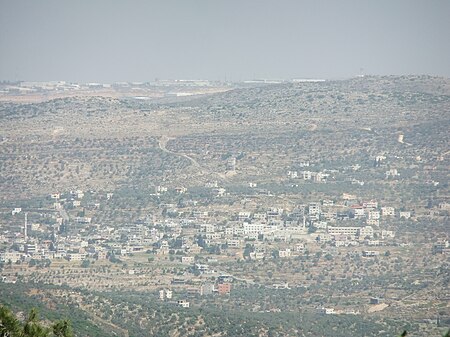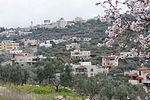Bani Zeid (Arabic: بني زيد) is a Palestinian town in the Ramallah and al-Bireh Governorate of Palestine, in the north-central West Bank, located 27 kilometers (17 mi) northwest of Ramallah, about 45 kilometers northwest of Jerusalem and about 6 kilometers (3.7 mi) southwest of Salfit. A town of over 6,000 inhabitants, Bani Zeid was founded when the villages of Deir Ghassaneh and Beit Rima merged to form a municipality in 1966 during the Jordanian rule.Bani Zeid owes its name to the Arab tribe that was granted the area as a fief by the Ayyubid sultan Saladin in the 12th century for having served in the Muslim army during the first Crusades. It was settled by members of the tribe alongside the native fellahin ("peasantry") during the reign of Mamluk sultan Baibars in the mid-13th century. During Ottoman rule, the area of Bani Zeid served as a sheikdom with some administrative capacity. It consisted of several villages with Deir Ghassaneh as its center. During that time, the Barghouti family dominated the sheikdom.
During the 1936–39 Arab revolt against British Mandate rule, Deir Ghassaneh primarily served as the scene of rebel gatherings and British military raids. In 1967, Bani Zeid was occupied by Israel during the Six-Day War, but was later transferred to full Palestinian security and administrative control in 2000. The next year it became the first Palestinian-controlled town to be known as the site of major operation by Israeli forces during the Second Intifada. When Fathiya Barghouti Rheime was elected mayor in 2005, Bani Zeid became the first Palestinian locality with a woman as head of the municipality, in concurrence with nearby Ramallah.
Historically, Bani Zeid's economy was dependent on the olive crop, which was supplied to soap factories in Nablus. Until the present day, olive trees cover most of the town's cultivable land. However, the residents of Bani Zeid today largely derive their income from employment in the civil service and private business. There are a number of archaeological sites in Bani Zeid, including the old town of Deir Ghassaneh, the manor of Sheikh Salih al-Barghouti and the maqam ("saintly person's tomb") of Sheikh al-Khawwas.








